Books
Books
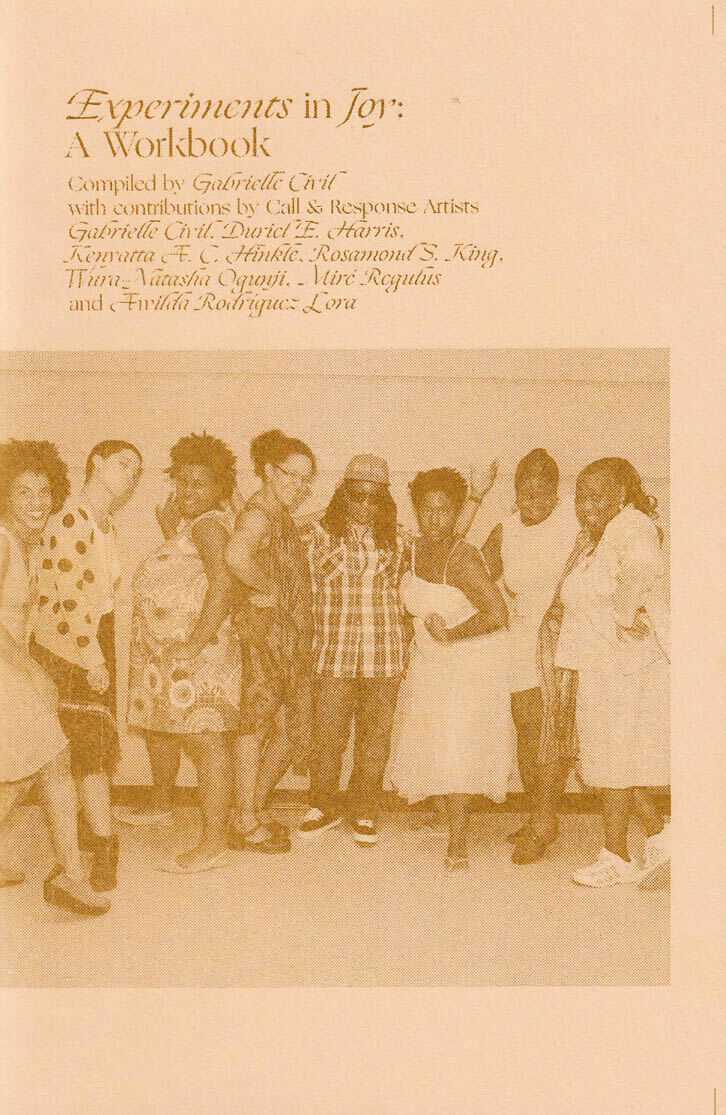
Experiments in Joy: A Workbook
Created by black women artists, this dynamic workbook can help you shift joy from a feeling to a practice. Engage its prompts, reflections, and resources for personal and creative transformation!
Compiled by Gabrielle Civil with contributions by Call & Response Artists Gabrielle Civil, Duriel E. Harris, Kenyatta A. C. Hinkle, Rosamond S. King, Wura-Natasha Ogunji, Miré Regulus and Awilda Rodríguez Lora.
Self published by Co—Conspirator Press with the support of Women's Center for Creative Work.
Designed by MJ Balvanera, Riso-printed by Nadinne Natalia and MJ Balvanera.
First edition published August, 2019, edition of 300.

Decolonizing Non-Violent Communication
Decolonizing NVC is a workbook stocked with activities, exercises, and ideas to explore our relationship to communication, our bodies, and each other. Using a trauma-informed approach, this workbook encourages readers to deepen our emotional vocabularies so that we can work towards a more enlivened, healthy interdependence.
Written by meenadchi. Edited by Nicole Kelly. Design by MJ Balvanera. Infographics by Hana Ward. Binding by WCCW Staff & Cynthia Navarro of Tiny Splendor.
Typeset in Sofia Pro by Olivier Gourvat from Monstardesign and Agentur Regular by Good Type Foundry.
First edition published March, 2019, edition of 200.
Second edition published in April, 2021, edition of 5000.
Third ediition published November 2023, edition of 3000.
Published by CO—Conspirator Press with the support of the Women’s Center for Creative Work. Printing by Nadinne Natalia, Lindsey Lee Eichenberger, and Cynthia Navarro at the Women’s Center for Creative Work.

Narrative of the Life of Frederick Douglass
Narrative of the Life of Frederick Douglass is an 1845 memoir and treatise on abolition written by famous orator and former slave Frederick Douglass during his time in Lynn, Massachusetts. It is generally held to be the most famous of a number of narratives written by former slaves during the same period. In factual detail, the text describes the events of his life and is considered to be one of the most influential pieces of literature to fuel the abolitionist movement of the early 19th century in the United States. Narrative of the Life of Frederick Douglass encompasses eleven chapters that recount Douglass's life as a slave and his ambition to become a free man.
In the tradition of Suhrkamp Verlag and Penguin Classics, Domain offers a series of elegantly designed pocketbooks, conceived as a starter kit for radical liberatory thought. The pocketbooks are individually crafted with custom book jackets tailored to each individual buyer; every purchase receipt supplying the raw material for each design. The online fulfillment system leverages the graphic language of the US Postal Service for each cover and packaging design.
More info on domainbooks.org

A Room of One's Own
A Room of One's Own is an extended essay by Virginia Woolf, first published in September 1929. The work is based on two lectures Woolf delivered in October 1928 at Newnham College and Girton College, women's colleges at the University of Cambridge. An important feminist text, the essay is noted in its argument for both a literal and figurative space for women writers within a literary tradition dominated by men.
In the tradition of Suhrkamp Verlag and Penguin Classics, Domain offers a series of elegantly designed pocketbooks, conceived as a starter kit for radical liberatory thought. The pocketbooks are individually crafted with custom book jackets tailored to each individual buyer; every purchase receipt supplying the raw material for each design. The online fulfillment system leverages the graphic language of the US Postal Service for each cover and packaging design.
More info on www.domainbooks.org
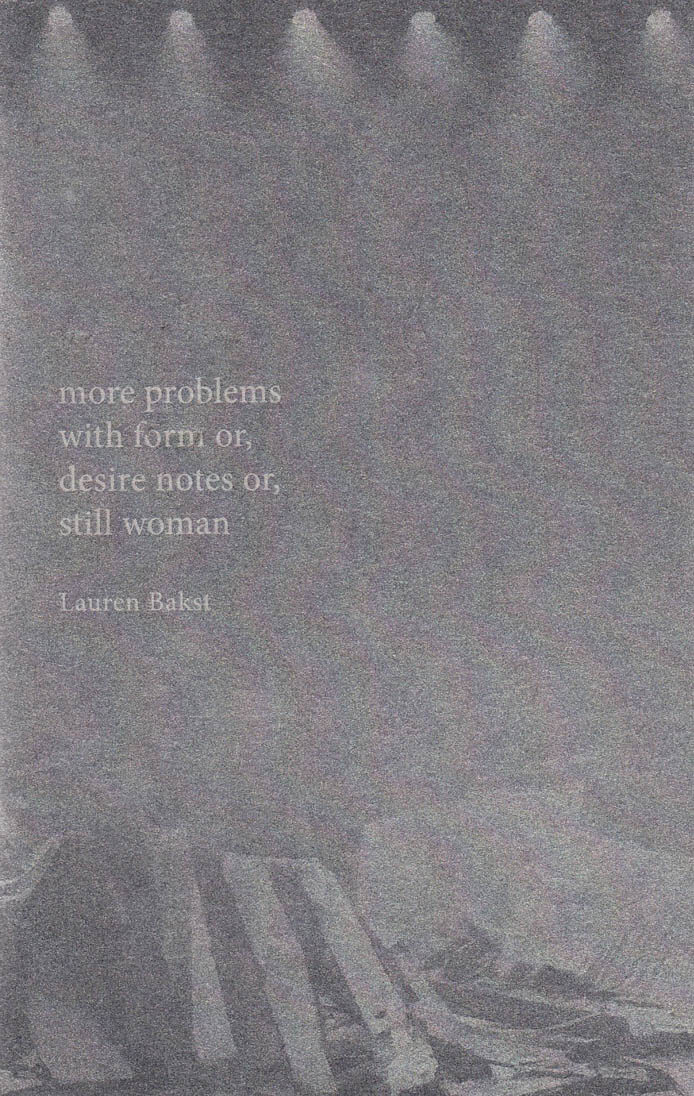
more problems with form or, desire notes or, still woman
Foregrounding the slippages between doing and undoing or not doing, speech and movement-based forms of address, and improvisation and the score, Lauren Bakst traces the forms performance takes, be they in our everyday experiences, intimate and personal relationships, memories, or on stage.
Lauren Bakst is an artist and writer living in New York. Working at the interstices of language and movement, Bakst stages critical phenomenologies of performance. Her video, publication, and performance works have been commissioned by BAM/Wendy's Subway, Dance and Process at The Kitchen, Klaus von Nichtssagend Gallery, Danspace Project, SculptureCenter, and Pioneer Works. Lauren teaches in Philadelphia at the University of the Arts School of Dance, where she is currently curating The School for Temporary Liveness, to which rile* was invited to participate in its second edition over the spring of 2020.
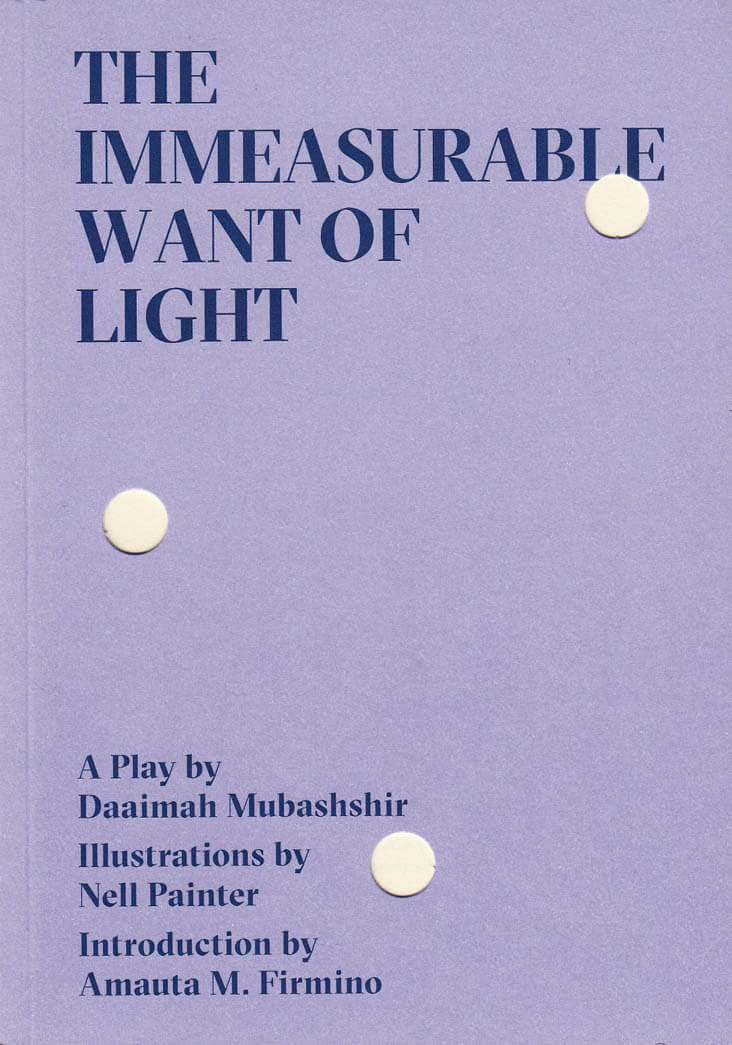
The Immeasurable Want Of Light
The Immeasurable Want of Light is a collection of many short plays drawn from Mubashshir’s two-year personal practice of writing a play a day to capture and express the ever-shifting perspective of living in black skin. Inspired by Chris Ofili’s Afro Muses, each play is distinct in subject, form and tone, presenting a constellation of theatrical portraits.
Daaimah Mubashshir is based in NYC. Awards include a 2019 Core Writer Fellowship at The Playwrights Center (MN), a 2018 Audrey Residency (New Georges), a MacDowell Colony Fellowship, a Catwalk Institute Residency, and a Foundation of Contemporary Arts Emergency Grant. Other published works include The Zero Loop (No Tokens Journal), Come with Me - Solve for X in The Occasional 2, edited by Will Arbery (53rd State Press), and Molasses and A Blue Coat (Kenyon Review). www.daaimahmubashshir.com
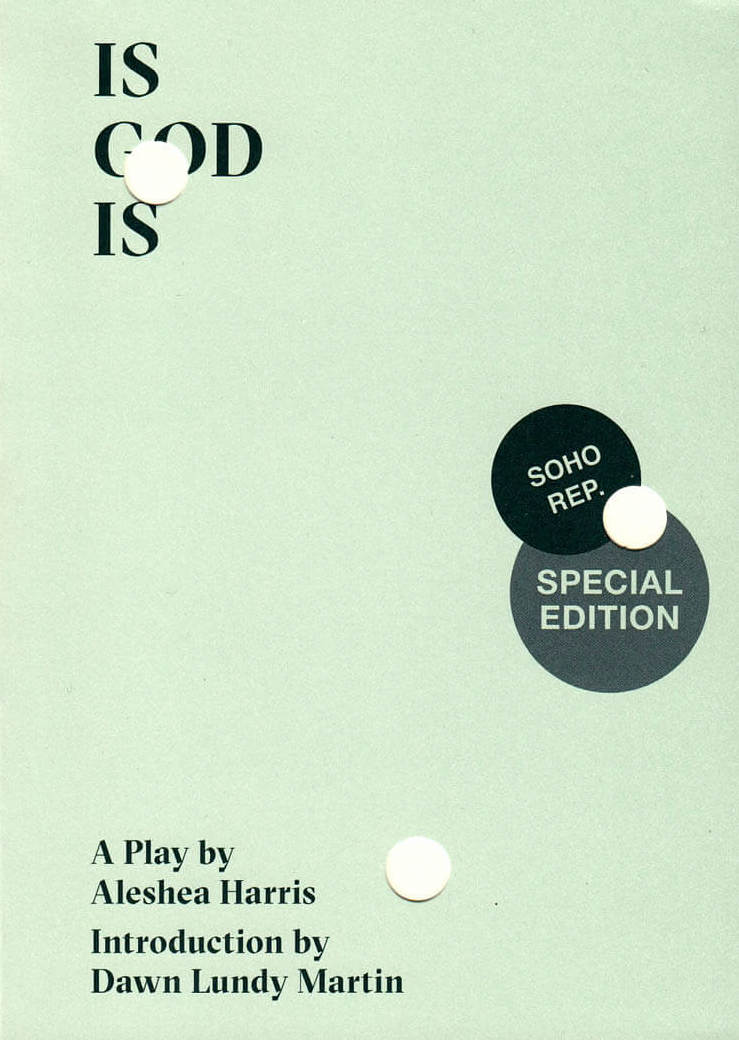
Is God Is
Blending epic tragedy, the Spaghetti Western, hip-hop and Afropunk, Is God Is is a revenge tale about twin sisters. In this award-winning work by playwright Aleshea Harris, emotions are laid bare through dialogue and visual gaps in language.
Aleshea Harris’s play Is God Is (Soho Rep) won the 2016 Relentless Award, an OBIE Award for playwriting in 2017, was a finalist for the Susan Smith Blackburn Prize and made The Kilroys’ List of “the most recommended and underproduced plays by trans and female authors of color” for 2017. What to Send Up When It Goes Down, a play-pageant-ritual response to anti-blackness, had its critically-acclaimed NYC premiere in 2018, was featured in the April 2019 issue of American Theatre Magazine and was nominated for a Drama Desk award.

A Piece of Work
Mixing live performance with algorithms and interfaces, A Piece of Work is the second project in Annie Dorsen’s “algorithmic theater” series. A digital Hamlet for a post-humanist age, A Piece of Work deploys a set of ingeniously designed computer algorithms to generate real-time adaptations of Shakespeare’s original play. New scenes, songs, scores and visuals emerge from an intricate web of technology. With an introduction by Dorsen, and screen-shots of the system as it runs, this book elaborates both the technological and the poetic procedures of algorithmic theater.
Annie Dorsen is a director and writer, whose works explore the intersection of algorithms and live performance.

Syncope
Through a series of prayers, invocations, and hymns, Syncope eulogizes those who have perished making Central Mediterranean crossings as well as collects first-hand accounts of those who have survived these perilous journeys. Forces of fate brought errant lives together for a hopeful safe passage and ultimately, linked these lives in their untimely deaths. Syncope attempts to shed some light on these lives, as well as the happenstance of living and dying while trying to cross a border.
Asiya Wadud is the author of Crosslight for Youngbird, published by Nightboat Books in 2018, day pulls down the sky… a filament in gold leaf written collaboratively with Okwui Okpokwasili (2019, Belladonna/ Danspace), and Syncope (UDP 2019). Her collection No Knowledge Is Complete Until It Passes Through My Body (Nightboat Books) is forthcoming in 2020. Asiya teaches poetry at Saint Ann’s School and leads an English conversation group for new immigrants at the Brooklyn Public Library.
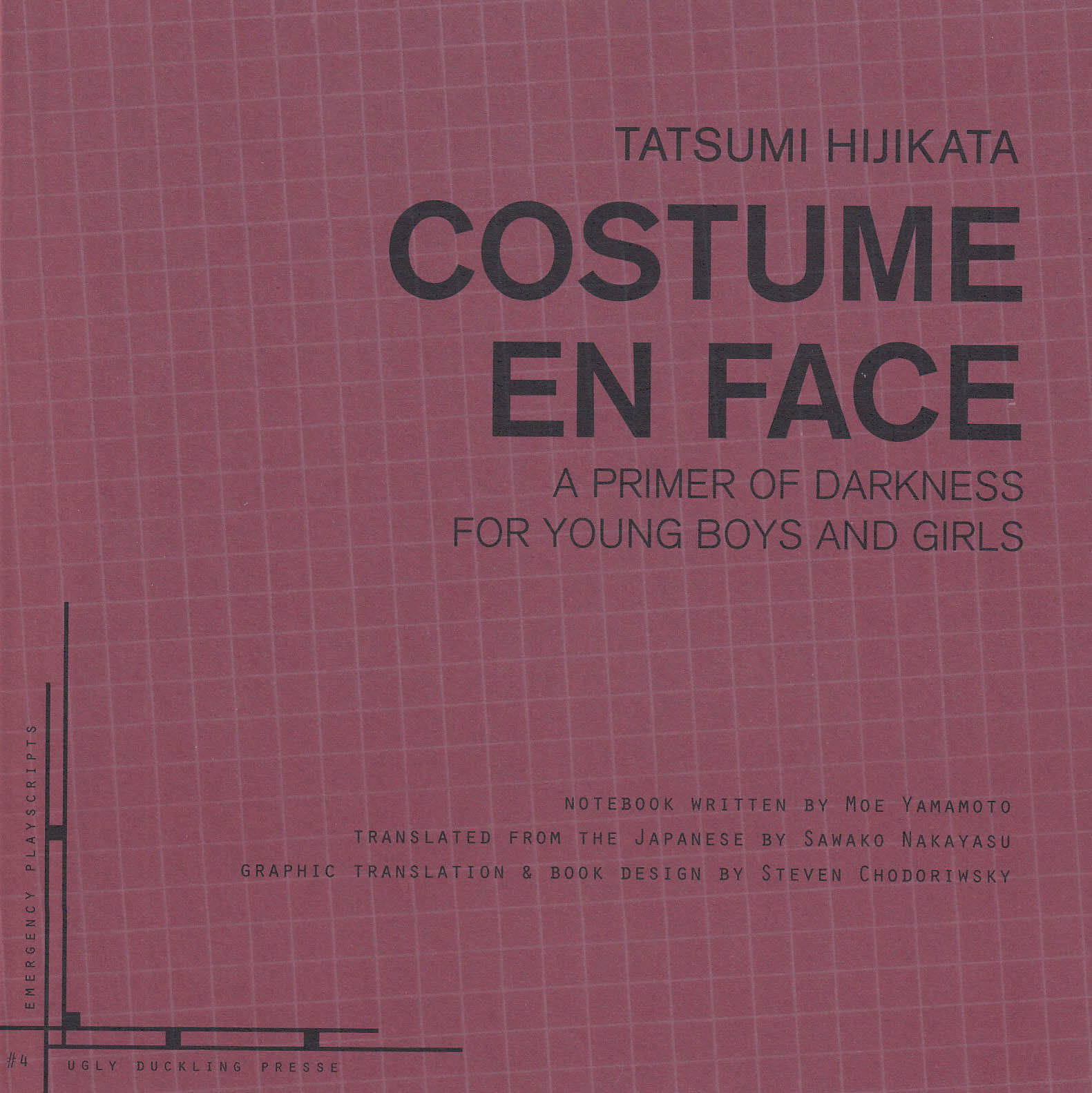
Costume En Face
As the founding father of the radical dance form that he called Butoh, Tatsumi Hijikata (1928-1986) is a legendary figure in the history of art and contemporary dance. Though influenced by Western artists and writers—the expressionist dance of Mary Wigman, the writings of Artaud, de Sade, Bataille, and Genet, and the drawings and paintings of Goya, Picasso, Toyen, Beardsley, and others–he was dedicated to the particular experience of the marginalized, Japanese suffering body after World War II.
In the mid-1970s, Hijikata became concerned with developing notation for his Butoh, and some of these Butoh-fu notations remain, largely in the form of notebooks transcribed by his disciples. Costume en Face is the first publication of one of Hijikata’s notebook notations in either English or Japanese. In it we can see, for the first time, the profound interconnectedness of language and body in Hijikata’s process of composition.
Tatsumi Hijikata was born in Japan in 1928. He founded the radical dance form known as Butoh, which requires dancers to internalize complex and often grotesque images, experiences and perspectives in order to produce precise movements. Even after his abrupt death in 1986, his dance works and writings continue to be extremely influential.

Chronology
Taking as its starting point an ultimately failed attempt to translate a Sesotho short story into English, Chronology explores the spaces language occupies in relationships, colonial history, and the postcolonial present. It is a collage of images and documents, folding on words-that-follow-no-chronology, unveiling layers of meaning of queering love, friendship, death, and power. Traveling from Cape Town to the Schomburg Center in New York, Zahra Patterson’s Chronology reveals and revels in fragments of the past-personal and the present-political.
Chronology was awarded the 2019 LAMBDA Literary Award for Lesbian Memoir/Biography.
Zahra Patterson is a writer and educator. Her short fiction has appeared in Kalyani Magazine and The Felt, and a reading of her play, Sappho’s Last Supper, was staged at WOW Café Theatre. She learned postcolonial theory in the bookshops of Nairobi and the bars of Cape Town and has an MFA in Writing from Pratt Institute.
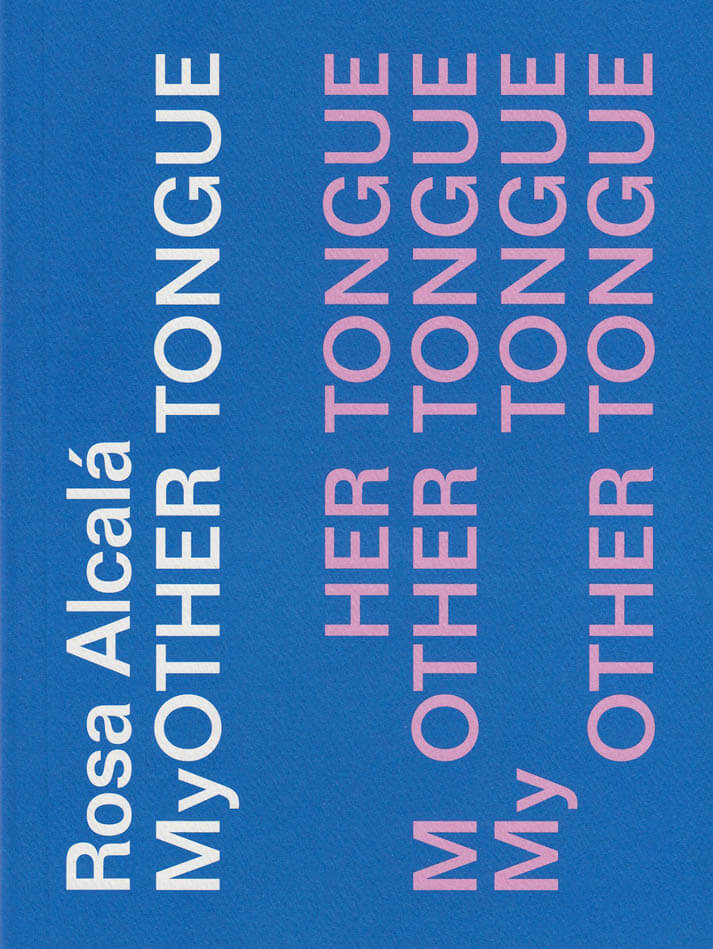
MyOther TONGUE
Rosa Alcalá's new poemario MyOTHER TONGUE begins in the archives of what has yet to be written. She writes with precision and dynamism from the borders between death (of a mother) and birth (of a daughter). What a body produces, and what produces a body: labor, trauma, memory, sacrifice, pain, danger, and language formed both on the tongue and in the culture and the spaces between what can be said and what is missing, the linguistic and existential problem of not having the right words. The darknesses in Alcalá's work emerge from what happens when we don't see ourselves in the languages that both form and destroy us as we labor in this 'dream called money.' Alcalá is a {un}documentarian of the highest order, a {un}documentarian of what history and memory try to erase. Her poems are urgent, demanding and haunting.
—Daniel Borzutzky
Rosa Alcalá is the author of Undocumentaries and The Lust of Unsentimental Waters.
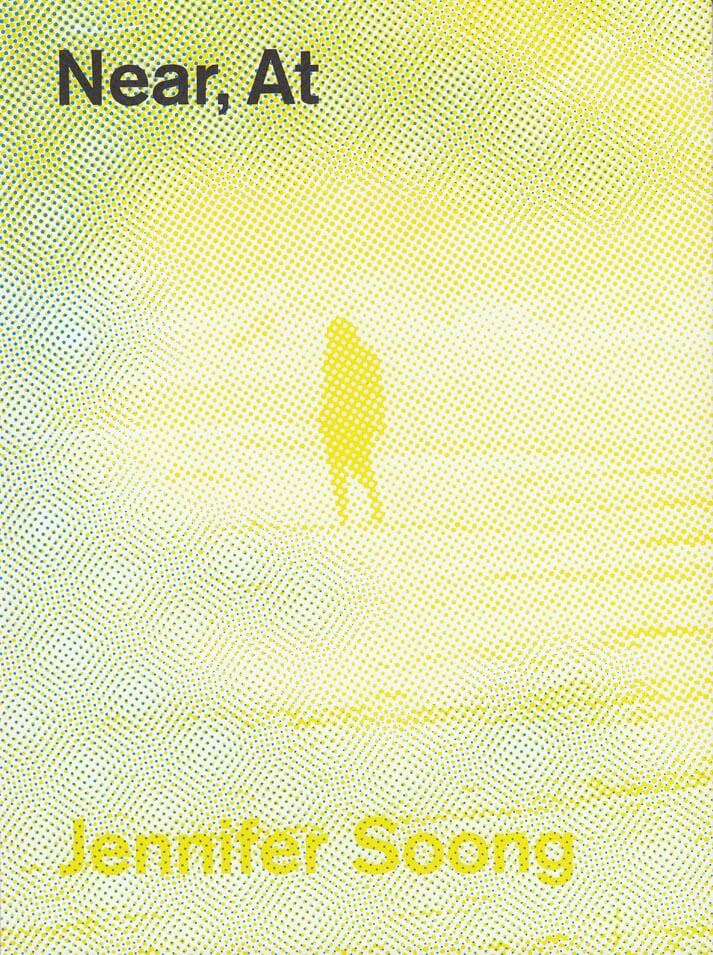
Near, At
Near, At follows the inherent strangeness of one’s consciousness as it observes and comes into contact with the physical world. A sustained exploration of language, capitalism, gender, and nature, Near, At traverses and measures the movement of silence against the movement of thought and its pauses. Divided into five parts, each with its own form, and followed by a series of ongoing love poems called MY CHRISTOPHER POEMS, this debut collection is slow to assume but quick to adjust. Rooted in both the traditional and the experimental, it asks just how little of ourselves we can be.
"Jennifer Soong’s collection displays her nuanced understanding of how the philosophical-treatise-as-poem can birth an emotional and embodied intelligence, placing her in a line of affinity with contemporary writers such as Lyn Hejinian, Lisa Robertson and Anne Boyer. Simultaneously, Soong accomplishes something utterly unexpected in 2019: she casts a harpoon into the New England landscape poem – long linked to the genteel, the male, the WASP – and brings it vibrant and expansive into the twenty-first century. Certain poetry collections are written to be 'of the moment,' but a collection such as Near, At is written to give pace to those moments, with each carefully placed word a further step taken by the poet and reader together. Come near, these poems tell us, and we feel we’ll arrive at exactly the time and place we need to be."
—Mia You

Hotel #5
Jon Auman, Thomas Chadwick and 1 more
Established in 2016, Hotel is a magazine for new approaches to fiction, non fiction & poetry. Hotel features work from established & emerging talent.Hotel provides the space for experimental reflection on literature’s status as art & cultural mediator.

Detour/Détours (Hotel Cordel No. 1)
Cécile Menon, Dominic Jaeckle and 1 more
Detour/Détours imagines debt as a language game: as a broken pun; a break in a journey; a play on value and the meaning of money as it changes hands. Or in terms of Guy Debord’s détournement — as a debt reimagined through the integration of old works into something new.
The word debtor owes etymologically to the old French deteur. But — moving into English — its first appearance dates back to the early 13th century and — sounded out as dettur, dettour or detour — debt can be read as an elaboration on the mottled intimations of a detour with a little poetic license. A detour is a deviation, a digression; a play on our various senses of direction. Exploring the will, want or need to take the long way around — and seeking to bastardize and scrutinize our relationship with (and conceptualization of) a statement of debt — here we have a set of searching works that critique all our methods of repayment. Participating authors were given free rein to produce a piece of writing in response to these ideas, and the works included herein — five first English-language translations and five original texts — wind their way around the weight of the word ‘debt’ in ten attempts to reroute its meaning.
Questions of Worth by Noémi Lefebvre, translated by Natascha Lasorak and Sophie Lewis
Silent B by Lauren Elkin
A Problem of the Greek Type by Mathieu Larnaudie, translated by Adrian Nathan West
Emotional Debt/Speed of Recovery Matrix by Selma Dabbagh
Debt Night by Preti Taneja
The Pastoral Calculation by Sandra Lucbert, translated by Jessica Spivey
The Debt Collector by Jen Calleja
Unknown Soldier by Nicolas Bouyssi, translated by Amanda DeMarco
Good Relations by Joanna Walsh
Out of Debt by Thomas Clerc, translated by Jeffrey Zuckerman
Edited by Emmanuel Bouju, Dominic Jaeckle & Cécile Menon
Limited Edition of 300 copies
180 x 120, paperback, 78 pages
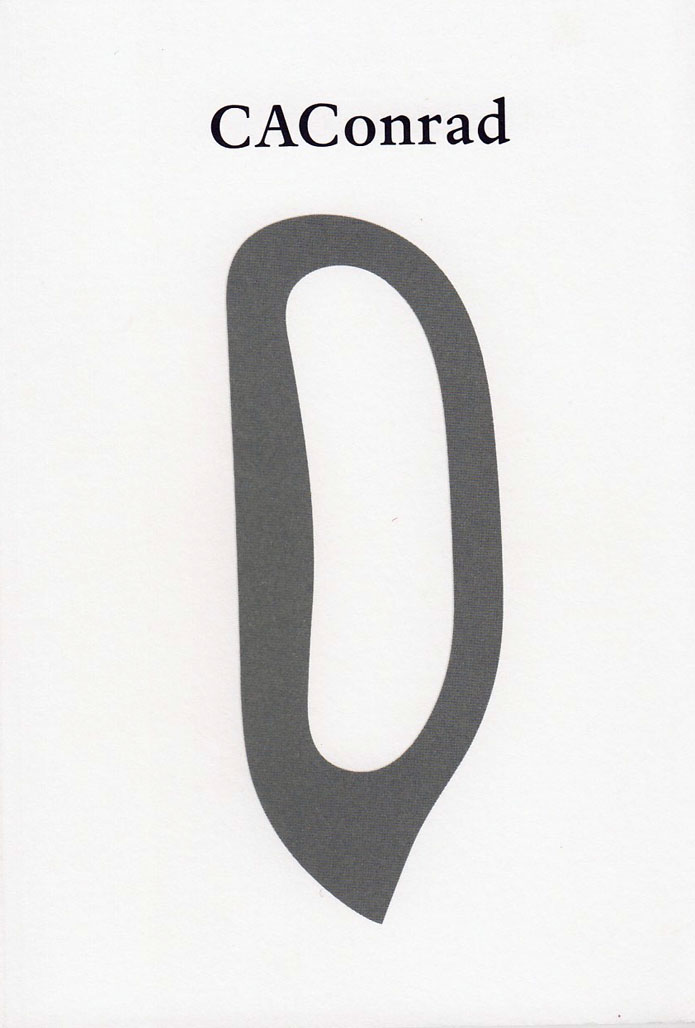
(Soma)tic and resulting poems
A collection of new poems following their (Soma)tics practice.
Fivehundred places was founded in 2012 by Jason Dodge. With a single printing of 500 copies, each book will find itself in one of 500 places. On the cover of each book is a dead scissor by Paul Elliman.
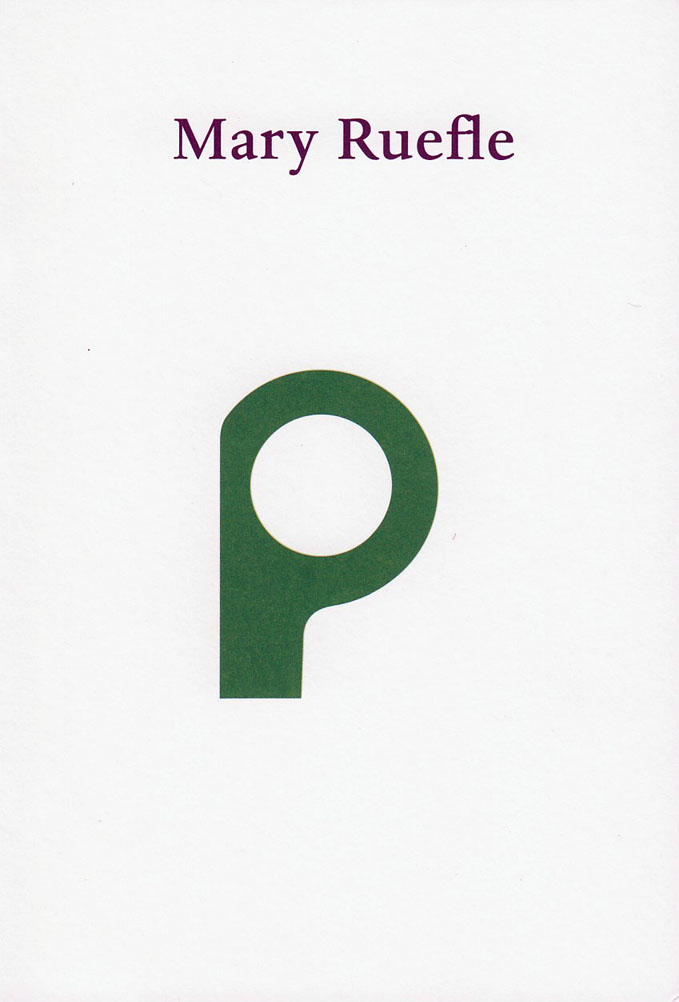
poems from Post Meridian
A collection of poems from their book Post Meridian.
Fivehundred places was founded in 2012 by Jason Dodge. With a single printing of 500 copies, each book will find itself in one of 500 places. On the cover of each book is a dead scissor by Paul Elliman.

Collected Poems
Collected poems by Heather Christle.
Fivehundred places was founded in 2012 by Jason Dodge. With a single printing of 500 copies, each book will find itself in one of 500 places. On the cover of each book is a dead scissor by Paul Elliman.
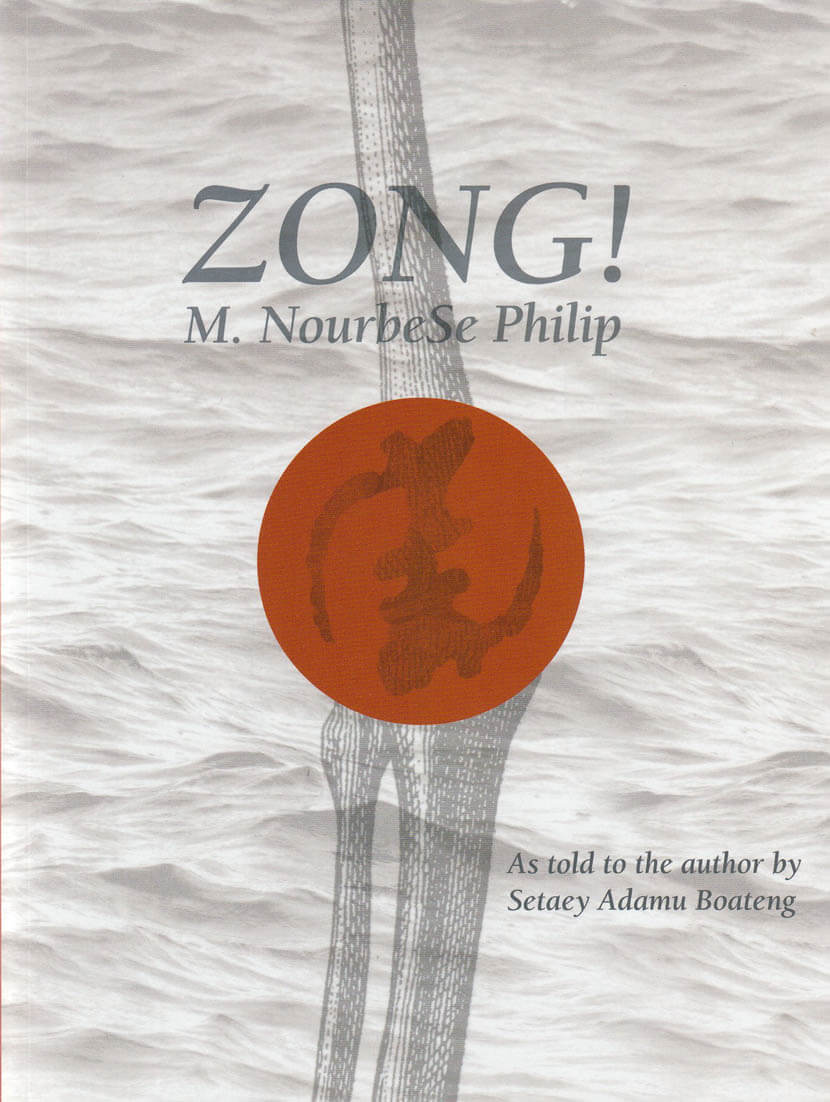
Zong!
In November, 1781, the captain of the slave ship Zong ordered that some 150 Africans be murdered by drowning so that the ship’s owners could collect insurance monies. Relying entirely on the words of the legal decision Gregson vs Gilbert—the only extant public document related to the massacre of these African slaves—Zong! tells the story that cannot be told yet must be told. Equal parts song, moan, shout, oath, ululation, curse, and chant, Zong! excavates the legal text. Memory, history, and law collide and metamorphose into the poetics of the fragment. Through the innovative use of fugal and counterpointed repetition, Zong! becomes an anti-narrative lament that stretches the boundaries of the poetic form, haunting the spaces of forgetting and mourning the forgotten.
"A haunting lifeline between archive and memory, law and poetry."

Neotenica
A slippery novel set in the Bay Area of the early aughts, where femininity, race, and class tangle together.
Neotenica is a novel of encounters: casual sex, arranged-marriage dates, cops, rowdy teenagers, lawyers, a Sapphic flirtation, a rival, a child, and two important dogs. At the center of it are Young Ae, a Korean-born ballet dancer turned PhD student, and her husband, a Korean-American male who inhabits an interior femininity, neither transgender nor homosexual, but a strong, visceral femininity nonetheless. This novel is an adrenaline-filled ride sliding across the surface of desire and chance through the quotidian turned playful.
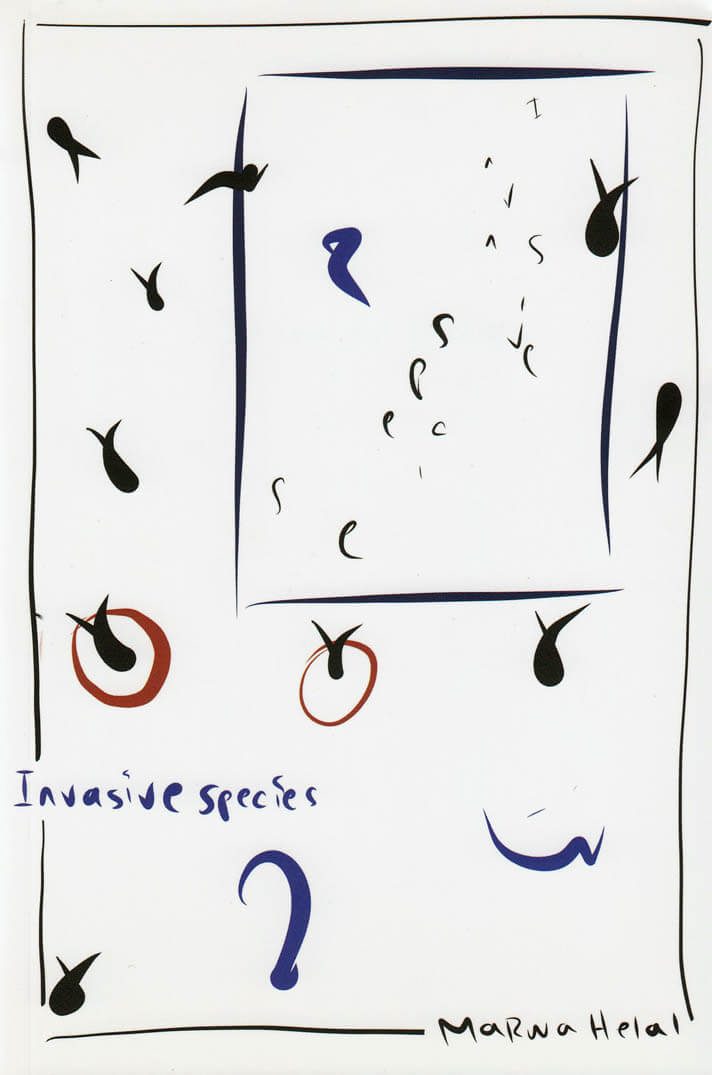
Invasive Species
A vernacular debut that uncompromisingly journeys towards its sole destination: the decolonization of the imagination.
In Invasive species, Marwa Helal’s searing politically charged poems touch on our collective humanity and build new pathways for empathy, etching themselves into memory. This work centers on urgent themes in our cultural landscape, creating space for unseen victims of discriminatory foreign (read: immigration) policy: migrants, refugees—the displaced. Helal transfers lived experiences of dislocation and relocation onto the reader by obscuring borders through language.

Bruce Boon Dismembered
Bruce Boone Dismembered collects nearly five decades of writing by Bruce Boone, a founder of New Narrative and critical figure at the crossroads of late-twentieth-century avant-garde and social movement writing. At once sexy and political, gossipy and scholarly, this crucial volume includes poems, stories, essays, interviews, and reviews.
In a time of disorder and disease, Boone’s body of work acts as a mirror to our dismembered global reality. This scavenged, collaged, taped-together collection provides a “map to negotiate perils” and guides us toward reconciliation with perilous futures. This book exemplifies the poignancy that might emerge from the found and frenetic.

Agatha Bauer
Maru Mushtrieva, Romy Kießling and 1 more
The title of publication series ‘Agathe Bauer’ stands for a broadly misheard hook “I’ve got the power” from a German 1990 Eurodance hit ‘The Power’ by the band Snap! The hook that turned the song into a hit, came from Jocelyn Brown’s track ‘Love's Gonna Get You’, but neither her name nor the track appears in the credits. And, here is where Agathe Bauer comes in - a mysterious being who acquires agency through the homophonic misinterpretation of the main hook “I’ve got the power”.
In ‘Issue Zero: Picking Up Promises’ Agathe has an agenda. Nothing could be as it would have been, but she is here to trace the sources of how it has become. Agathe Bauer is here to analyze the capacity of misinterpretation to unveil asymmetric power structures in knowledge systems and by tuning into the social-political, cultural and aesthetic dimension of it.
‘Issue Zero: Picking Up Promises’ features contributions by: Gabriela Acha, [{“CIBELLE”(CAVALLI}BASTOS)], Lynn Hershman Leeson, Romy Kießling, Markues, Luzie Meyer, Maru Mushtrieva, Claudia Pagès, Ruth Wolf-Rehfeldt, Miriam Stoney, Christine Sun Kim, Eric Winkler, Miriam Yammad, Anna Zett.
Conceptualized and edited by Gabriela Acha, Romy Kießling, Maru Mushtrieva.
Designed by Timur Akhmetov.

HULL
In this debut collection by African American poet Xandria Phillips, HULL explores emotional impacts of colonialism and racism on the Black queer body and the present-day emotional impacts of enslavement in urban, rural, and international settings. HULL is lyrical, layered, history-ridden, experimental, textured, adorned, ecstatic, and emotionally investigative.
Xandria Phillips is a poet and visual artist from rural Ohio. They are the author of Reasons For Smoking, which won the 2016 Seattle Review chapbook contest judged by Claudia Rankine. Their poem "For a Burial Free of Sharks" won the 2016 Gigantic Sequins poetry contest judged by Lucas De Lima. Xandria is the poetry editor at Honeysuckle Press, and a teaching artist for Winter Tangerine's NYC workshops. Their work is featured or forthcoming from Virginia Quarterly Review, Black Warrior Review, Crazyhorse, West Branch, and elsewhere.